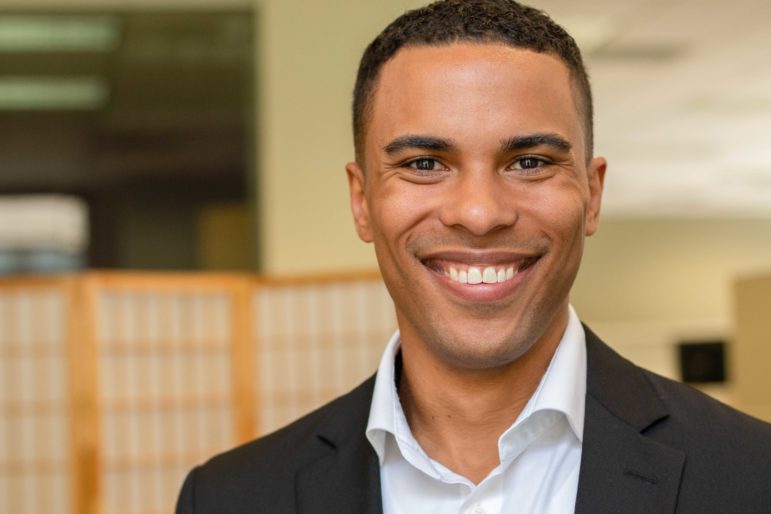
This year marks three years of Fresh Energy’s Energy Access and Equity program, though the seeds of our work were planted even before that. I joined the Fresh Energy team in 2015, with an initial focus on supporting our involvement in the Minnesota Multifamily Affordable Housing Energy Network (MMAHEN) and work to increase energy efficiency in affordable multifamily buildings. Over the next several years, my portfolio grew to include broader issues including energy affordability and access to renewable energy, and by early 2018, Fresh Energy launched the Energy Access and Equity program area. The program expanded in August of that year with the addition of Janiece Watts, and again in early 2021 with the addition of Mari Ojeda.
As the Energy Access and Equity program at Fresh Energy has grown, we have achieved a lot—but we have learned even more. In this moment, I wanted to share a reflection on what we have done, and more importantly, what we have learned.
1. Equity in both process and outcome
In Fresh Energy’s Energy Access and Equity work, we have developed the following definition of “equity”: the elimination of barriers to full participation in the process, and access to the full benefits of the outcome. This intentionally broad definition is designed to reflect the unique needs of any given individual, group, or community, and acknowledge that fully realizing this definition of equity in practice will inherently require different levels of investment (such as time, outreach and education, or financial support) for certain groups, especially those who have been historically marginalized or excluded.
The emphasis on both process and outcome is important because of the risks in focusing on only one component. For example, a clean energy policy that is designed without the involvement of impacted individuals, including under-resourced people and people of color, is not automatically equitable merely because it improves outdoor air quality by reducing fossil fuel-powered energy generation. Impacted communities should have direct access to clean energy to truly reap the benefits. Similarly, a program that is designed with “input” or “feedback” from under-resourced people and people of color is not equitable if the program is then marketed and delivered to more affluent communities (and importantly, there is a difference between input and true community engagement).
We must put in the work to truly embed equity in both the process and the outcome.
2. This work takes time
In the energy and climate space, we recognize the urgency of the issue of climate change. Within the last two years, two independent entities, the Intergovernmental Panel on Climate Change (IPCC) and the International Energy Agency (IEA), have both agreed that we must aggressively reduce carbon emissions by 2050 to avoid the worst impacts of climate change. The conclusion, understandably, is that we have to act quickly–there is no time to wait.
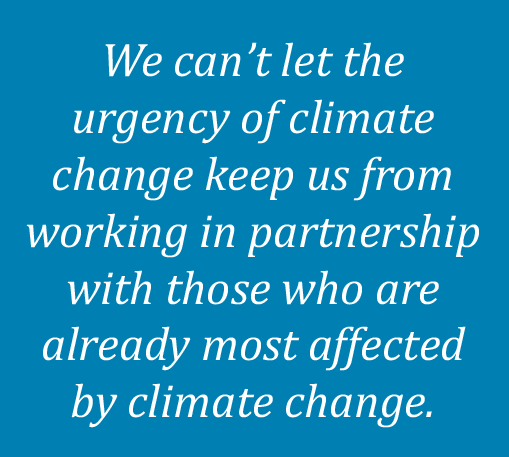
While it is true that we do need to move swiftly, the truth is that working in collaboration with impacted individuals, co-creating solutions, and truly developing partnerships, all take time. It takes time to build trust, and to challenge ourselves to be open to different ways of working together. But we can’t let the urgency of climate change keep us from working in partnership with those who are already most affected by climate change. Instead, we need to invest in those partnerships and simultaneously use our own privilege to bring more voices into the process of developing ambitious climate and energy policies.
Frankly, much of our Energy Access and Equity work over the last three years would not be possible without our partners and allies: Community Stabilization Project, our Energy Efficiency for All (EEFA) partners and MMAHEN members, the Climate Equity Table, Energy CENTS Coalition, and others. We have been fortunate to work with, and learn from, so many with whom we’ve built relationships over the years, and I believe our work has been better for it.
Community Stabilization Project (CSP) in particular has been a patient and trusting partner for Fresh Energy. Metric Giles, CSP’s executive director, was a founding member of MMAHEN in 2014, and voiced early on that we needed to do a better job of engaging renters in those efforts. Over time, and with Fresh Energy’s share of missteps along the way, we formed a partnership with CSP that continues to this day. CSP and Metric have been invaluable partners to us in our work on environmental and housing justice, and I am grateful for every conversation we have had.
The other aspect of “time” is the amount of time that is necessary to create meaningful, durable change: the four years of advocacy that was necessary to support the passage of the Energy Conservation and Optimization (ECO) Act, which includes key equity-focused improvements to our state’s energy efficiency laws, for example, or the time invested to collaboratively develop recommendations with our EEFA partners to improve utility resource planning processes–and yes, even Fresh Energy’s own Strategic Framework, which was crafted through months of thoughtful conversations across our staff and board, resulting in a strategy that prioritizes both ambition and equity.
Equity work is patient, sometimes slow work. But that does not mean that it stands in the way of bold, ambitious, climate action. In fact, they must go hand-in-hand.
3. Equity and justice are non-negotiable
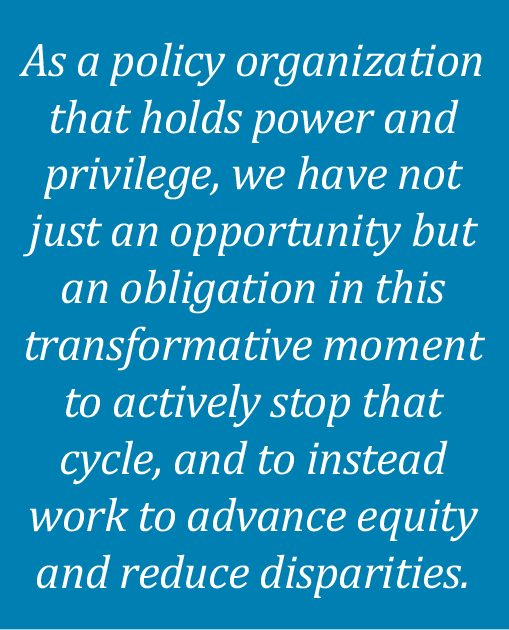
Too often throughout history, communities of color and under-resourced communities have been left behind in times of transformational change. At best, this has been due to a lack of intentionality to ensure that everyone’s needs are met. At worst, this has been due to malicious intent to harm or degrade certain communities and protect others. The history of our state and our country as a whole is riddled with examples—from redlining and other racist policies in the housing sector, to environmental hazards like industrial facilities and waste sites disproportionately located in or around communities of color through land use and planning, to the construction of the federal interstate highway system through communities of color, including right here in Saint Paul, in the Rondo neighborhood. These policy choices over time have had ripple effects which endure to this day: through the loss of generational wealth, loss of housing and mobility options, and negative impacts to public health. In short, this is all due to institutions with power and privilege actively creating and upholding systems that benefit some and harm others over decades if not centuries. As a policy organization that holds power and privilege, we have not just an opportunity but an obligation in this transformative moment to actively stop that cycle, and to instead work to advance equity and reduce disparities.
While there is always more to learn and more work to do to truly center equity in our efforts, we know that it can be done. We can work to advance carbon-free energy while ensuring that the workforce that is necessary to carry out our clean energy transition represents the growing diversity of our state. We can ensure that Minnesotans have more options to purchase electric vehicles while also working to provide more equitable transportation options, including electrified public transit. And we can carry on undeterred in our work to speed Minnesota’s transition to a clean energy economy, while also committing to diversity, equity, and inclusion and anti-racism.
Working on climate and working on equity is only an either-or choice if we decide to make it so.
4. We are on a journey
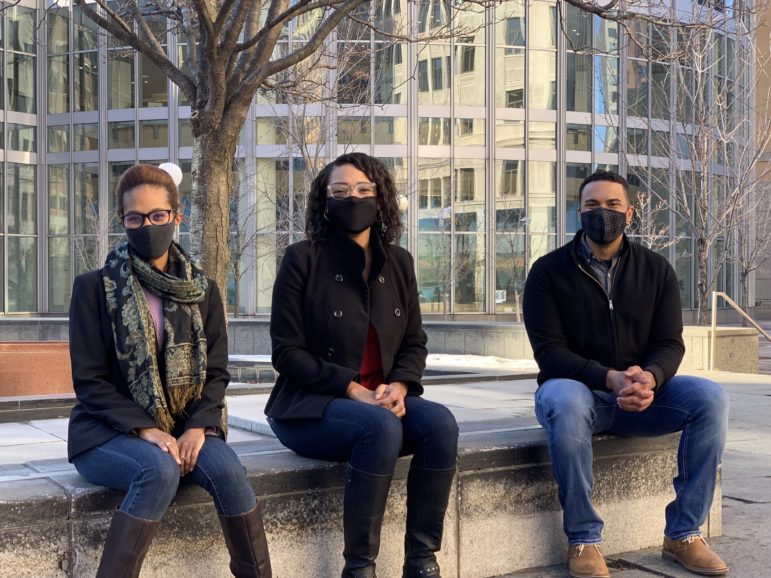
With all of this in mind, it is important to remember that we are on a journey. There is no destination; only constant learning and growth to inform further action. As our Commitment to Anti-Racism states: “We know that this work will not always be easy, and that we may struggle and even fail at times. But we are committed to owning our mistakes, combatting complicity, and continuing to learn, grow, and act…”
When we formed the Energy Access and Equity program in 2018, I had no idea what the journey would bring. But three years later, I am so grateful to have embarked on this path. I am grateful to Michael Noble and Sarah Clark for supporting the growth of this program and serving as critical thought partners. I am grateful to my ultra-talented colleagues, Janiece Watts and Mari Ojeda, who bring such important perspectives to this work and who have helped me grow as well. I’m grateful to fellow strategic leads, Margaret Cherne-Hendrick, Allen Gleckner, and Justin Fay, for their leadership and embodiment of our interconnected strategies. I’m grateful to Mat Larson Krisetya for his thoughtful collaboration and commitment to making Fresh Energy a welcoming place for all, and to Jo Olson for her dedication to inclusive and accessible communications. And I am grateful to the entire Fresh Energy team, who leaned into this work together (including through our staff-led Diversity, Equity, and Inclusion Committee and Women, Trans, Femme group) and have collectively advanced our commitments.
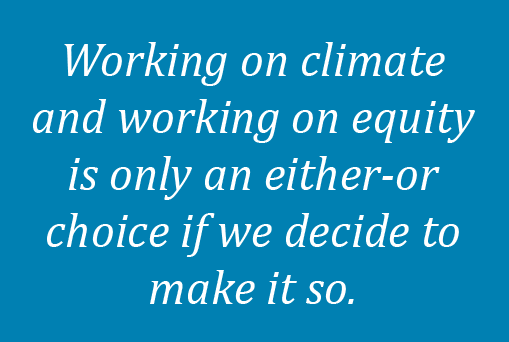
This work is a journey. But as Fresh Energy continues its work to shape and drive bold policy solutions to achieve equitable carbon-neutral economies, I couldn’t be more confident that we are on the right path. Following the passage of the ECO Act, we are poised for even more equitable clean energy progress at the Legislature moving forward. Clean Cars Minnesota presented an opportunity to build a powerful coalition of organizations focused on both climate and environmental justice. And Fresh Energy’s own mission has evolved to fully identify equity as central to our work.
Fresh Energy envisions a just, prosperous, and resilient future for all Minnesotans, and is committed to continuing the momentum of the Energy Access and Equity program and doing the necessary work to create a world where all can thrive.
Update:
On July 16, 2021, Ben announced that he has accepted a new role as Midwest Climate & Energy Senior Program Officer at McKnight Foundation. Ben’s last day with Fresh Energy will be September 3, 2021. This transition will be bittersweet for Fresh Energy, but Ben is leaving the organization prepared to continue his legacy and grow the Energy Access and Equity team to take on the challenges presented by climate change, a just energy transition, and equity across the energy sector. Ben’s move to the McKnight Foundation is a monumental win for all organizations working in clean energy and climate justice throughout the Midwest. We wish Ben and the team at the McKnight Foundation the very best and we look forward to continuing our work together on swift action toward a just, carbon-neutral future.
